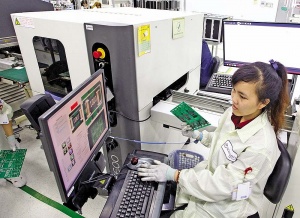Semiconductor human resource training ramps up
Deputy Prime Minister Le Thanh Long on September 21 approved the scheme on developing human resources (HR) for the semiconductor industry towards 2030.
| Semiconductor human resource training ramps up, Source: Shutterstock |
Accordingly, the country will train and develop a high-quality workforce in the chip industry, focusing on the design, packaging and testing of semiconductor chips, gradually mastering technology in the semiconductor manufacturing process, including training at least 50,000 university-level or higher-qualified workers for in all stages of the semiconductor value chain.
By 2050, the country will have a strong workforce, joining the global semiconductor value chain; capable of meeting the development requirements of the Vietnamese industry in both quality and quantity.
In addition, in-depth training on the semiconductor industry for 1,300 Vietnamese lecturers teaching at research institutes and facilities education universities, training support facilities and businesses.
Based on the balance of capacity, the state budget supports investment to form, upgrade, and modernise four national shared semiconductor laboratories serving the training of HR in the industry at nearly 20 public higher education institutions nationwide.
By 2050, it is necessary to strive to meet the demand in Vietnam for the quantity and quality of employees in the semiconductor industry in all stages of the value chain. Training institutions, especially higher education institutions, are capable of training high-quality HR for developing Vietnam’s chip industry.
According to Deputy Minister of Planning and Investment Tran Quoc Phuong, it is necessary to pull in large-scale, environmentally friendly, and high-tech projects to improve the quality of foreign funding for the segment across the country.
“Currently, to entice foreign investment to the country, it is necessary to ensure basic conditions for investors to look at and come to Vietnam, in which HR is one of the prerequisites,” Phuong said at a dialogue between the prime minister and investors held last week at the Ho Chi Minh City Economic Forum.
“HR training is a major orientation and breakthrough of our Party and state. In HR development, there are additional policies to engage new generation initiatives in IT, semiconductors, or new fields,” Phuong said.
Vietnam wants to train 100,000 engineers and high-tech workers in semiconductors and AI by 2030, Phuong added.
Le Quang Dam, general director of Marvell Vietnam, said that the nation’s HR were not ready to develop the field to a higher level, but he believes that the country was making efforts in the area.
As one of the few prominent chip designers in the United States, Marvell has been in the country for 11 years with only a dozen engineers at first, but has now reached a milestone of more than 400 engineers.
“This progress exceeds the 50 per cent growth target within three years committed by chairman Matt Murphy at the Vietnam-US Summit on investment and innovation held in 2023,” Dam said.
The country is well-developed in technology and engineering, and a great advantage is that young Vietnamese people are very talented when studying mathematics, languages, engineering, science, said Dam.
“Students who graduate from electronics majors can work in the chip segment easily because they have a very solid basic knowledge of science, electronics, physics, and chemistry,” he said. “However, the scale of universities is still small, and the quality is limited compared to universities in the region and wider world. It takes time to cooperate with schools and institutes to build a source of HR.”
Developers such as Samsung, Qualcomm, Infineon, and Amkor have entered Vietnam’s market with large-scale projects to build factories, expand production, and assemble with a value of up to billions of US dollars. It is forecast that by the end of 2024, the value of Vietnam’s semiconductor segment will exceed $6.16 billion, making Vietnam one of the important production centres for chip enterprises worldwide.
 | Vietnam thirsty for semiconductor human resources Human resources are a key factor in Vietnam's participation in the semiconductor industry, but to quickly improve both quantity and quality, sustainable, long-term training and appropriate strategies are essential. |
| Vietnam to launch investment incentives for semiconductor industry Vietnam is set to introduce a robust incentive framework to selectively attract foreign investment into high-tech industries, particularly in the semiconductor and electronics sectors, to be backed by central and local government budgets. |
What the stars mean:
★ Poor ★ ★ Promising ★★★ Good ★★★★ Very good ★★★★★ Exceptional
Related Contents
Latest News
More News
- Masan Consumer names new deputy CEO to drive foods and beverages growth (February 23, 2026 | 20:52)
- Myriad risks ahead, but ones Vietnam can confront (February 20, 2026 | 15:02)
- Vietnam making the leap into AI and semiconductors (February 20, 2026 | 09:37)
- Funding must be activated for semiconductor success (February 20, 2026 | 09:20)
- Resilience as new benchmark for smarter infrastructure (February 19, 2026 | 20:35)
- A golden time to shine within ASEAN (February 19, 2026 | 20:22)
- Vietnam’s pivotal year for advancing sustainability (February 19, 2026 | 08:44)
- Strengthening the core role of industry and trade (February 19, 2026 | 08:35)
- Future orientations for healthcare improvements (February 19, 2026 | 08:29)
- Infrastructure orientations suitable for a new chapter (February 19, 2026 | 08:15)

 Tag:
Tag:


















 Mobile Version
Mobile Version